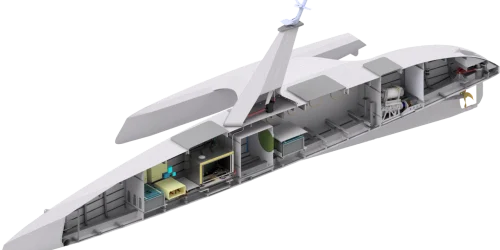
Powered by Marine AI’s GuardianAI™ Software Suite, these vessels navigate, detect obstacles, and make intelligent decisions in real time—minimising human intervention while maximising performance.
How GuardianAI™ is shaping the future of the maritime industry:
AI-Powered Navigation & Collision Avoidance
Uncrewed vessels use sensor fusion technology, combining radar, LiDAR, sonar, and camera data, to safely navigate through complex marine environments.
Mission Autonomy & Remote Supervision
GuardianAI enables vessels to operate independently or under remote supervision, ensuring precise execution of long-range missions with minimal human oversight.
Sustainable Operations
Autonomous vessels reduce fuel consumption and emissions through optimised route planning.
Multi-Vessel Coordination & Fleet Autonomy
Uncrewed vessels can operate as a coordinated fleet, sharing real-time data for collaborative decision-making, improved efficiency, and greater situational awareness.
Marine AI’s GuardianAI™ platform is pioneering the future of autonomous uncrewed vessels, offering a scalable, intelligent, and adaptable approach to maritime operations. As the demand for safer, more efficient, and sustainable solutions grows, autonomous vessels are set to redefine the global maritime landscape.
Explore the industries where autonomous uncrewed vessels are making a profound impact here.
The Mayflower
Autonomous Ship
In June 2022, the Mayflower Autonomous Ship set sail on the world’s first autonomous Atlantic crossing. Driven by our technology, in collaboration with MSubs, IBM, and ProMare, The Mayflower’s historic crossing within just three years of our inception stands as a testament to our technological prowess and historical significance in maritime innovation.
Serving as a scientific platform, MAS enhances oceanic research, aligning with our mission to ensure maritime safety, efficiency, and sustainability for the future.
Explore our other case studies here.

